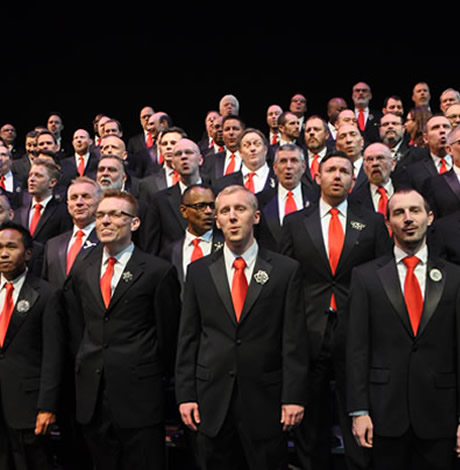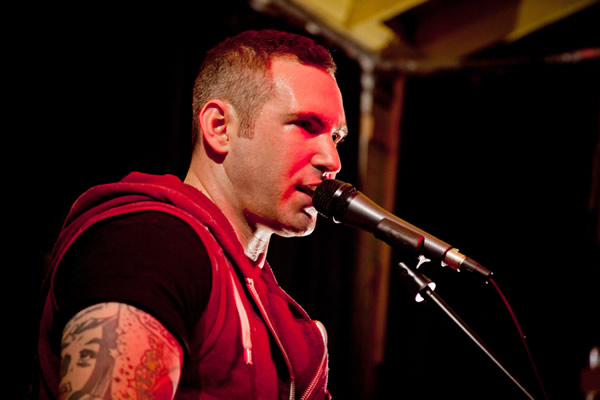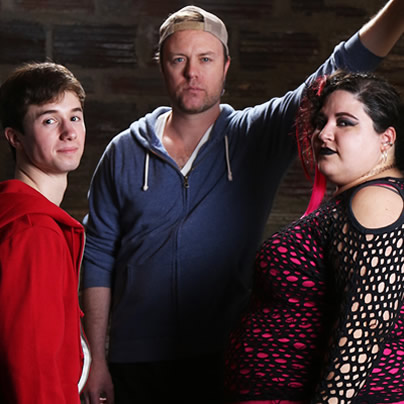Arts & Entertainment
Psychology of abuse
Lesbian drama explores tumultuous relationship set in Baltimore
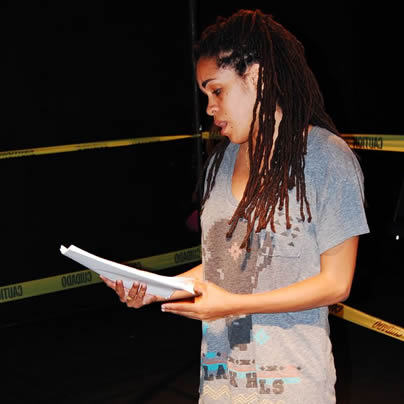
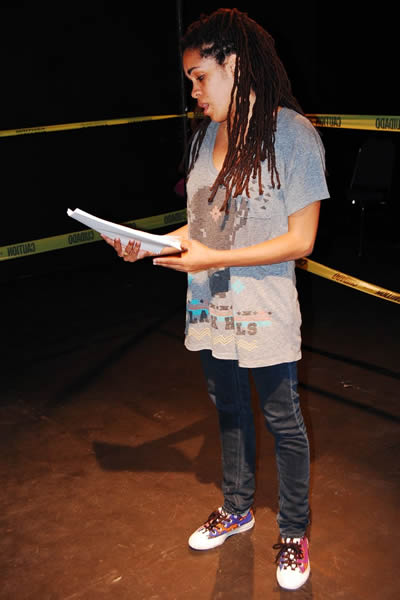
Playwright Ira Kip in Washington last weekend for performances of her lesbian domestic violence drama ‘She’Baltimore.’ (Photo courtesy Kip)
At last weekend’s D.C.-area debut of writer/director Ira Kip’s new play “She’Baltimore,” the scene was set for a fight, possibly to the death. The production’s spare set suggested a boxing ring. There were the standard chairs in opposite corners, but instead of ropes, the ring was fenced by crime scene tape.
Set in Baltimore, Kip’s hour-long theater piece explores domestic violence within the LGBT community. It focuses on Linay (also Kip in a nuanced performance) and her girlfriend Ebone (nicely underplayed by Nicole McManus). They have their good times, but when things go wrong between them, they go toxically wrong, resulting in beatings and emergency room visits. Interestingly the playwright (who declines to state her own sexual orientation) has somewhat blurred the lines regarding blame: Yes, it’s Ebone who busts her lover’s lip, but then again there’s Linay’s explosive temper. And when Ebone makes a move to exit what she realizes is an unsalvageable relationship, it’s Linay who pleads with her to stay.
Before coming to D.C., “She’Baltimore” premiered in Amsterdam and then played in Baltimore. In celebration of D.C. Black Pride, the Blade sponsored the production’s two-night run at the Warehouse over Memorial Day weekend. And despite some problems beyond the production’s control — loud music blared from Warehouse’s neighbor, the New York Avenue Beach Bar; and Kip was called upon rather last minute to understudy for the actor slated to play Linay — the May 25th performance was a success.
Kip is a gifted playwright. She seamlessly shifts from lyrical prose to raw dialogue. The play’s vignette-like scenes can stand alone, but when strung together they’re more powerful, taking the audience deep into what defines the couple’s disturbing relationship — sexual attraction, beatings, affection, frustration, anger, drug abuse — it’s all there. Additionally, Linay and Ebone come with baggage. Both women are regrettably estranged from their families largely due to their sexuality.
The production’s five-member cast was made up of gay, straight and bisexual black women. As the narrator, Sherry Richardson intermittently relayed domestic violence crimes ripped from the local Baltimore nightly news. Heather Smith played a dismissive intake nurse with a bad attitude. While supplying comic relief, the character also searingly represents the system’s insensitivity and lack of training. And Nia Johnson was appealing as Angel, Linay’s emotional port in the storm.
A post-show discussion on the play’s theme featuring the cast was led by production assistant Bakari Jones.
Kip is Caribbean-born. She has lived in the Netherlands but now calls New York City home. Her play is partly an indictment of America’s reluctance to understand gay people’s lives more fully and its inability to properly respond to LGBT mental and physical health issues in relation to domestic abuse. “She’Baltimore” puts the spotlight on important but not widely discussed topics.

Team DC, the umbrella organization for LGBTQ-friendly sports teams and leagues in the D.C. area, held its annual Night of Champions Awards Gala on Saturday, April 20 at the Hilton National Mall. The organization gave out scholarships to area LGBTQ student athletes as well as awards to the Different Drummers, Kelly Laczko of Duplex Diner, Stacy Smith of the Edmund Burke School, Bryan Frank of Triout, JC Adams of DCG Basketball and the DC Gay Flag Football League.
(Washington Blade photos by Michael Key)




















The 2024 National Cannabis Festival was held at the Fields at RFK Stadium on April 19-20.
(Washington Blade photos by Michael Key)
















Covering the @NatlCannaFest at RFK Stadium for @WashBlade . Stop by the LGBTQ+ booth and pick up a paper if you are here. pic.twitter.com/is7hnsaPns
— Michael Patrick Key (@MichaelKeyWB) April 20, 2024
Theater
‘Amm(i)gone’ explores family, queerness, and faith
A ‘fully autobiographical’ work from out artist Adil Mansoor

‘Amm(i)gone’
Thorough May 12
Woolly Mammoth Theatre
641 D St., N.W.
$60-$70
Woollymammoth.net
“Fully and utterly autobiographical.” That’s how Adil Mansoor describes “Amm(i)gone,” his one-man work currently playing at Woolly Mammoth Theatre.
Both created and performed by out artist Mansoor, it’s his story about inviting his Pakistani mother to translate Sophocles’s Greek tragedy “Antigone” into Urdu. Throughout the journey, there’s an exploration of family, queerness, and faith,as well as references to teachings from the Quran, and audio conversations with his Muslim mother.
Mansoor, 38, grew up in the suburbs of Chicago and is now based in Pittsburgh where he’s a busy theater maker. He’s also the founding member of Pittsburgh’s Hatch Arts Collective and the former artistic director of Dreams of Hope, an LGBTQ youth arts organization.
WASHINGTON BLADE: What spurred you to create “Amm(i)gone”?
ADIL MANSOOR: I was reading a translation of “Antigone” a few years back and found myself emotionally overwhelmed. A Theban princess buries her brother knowing it will cost her, her own life. It’s about a person for whom all aspirations are in the afterlife. And what does that do to the living when all of your hopes and dreams have to be reserved for the afterlife?
I found grant funding to pay my mom to do the translation. I wanted to engage in learning. I wanted to share theater but especially this ancient tragedy. My mother appreciated the characters were struggling between loving one another and their beliefs.
BLADE: Are you more director than actor?
MANSOOR: I’m primarily a director with an MFA in directing from Carnegie Mellon. I wrote, directed, and performed in this show, and had been working on it for four years. I’ve done different versions including Zoom. Woolly’s is a new production with the same team who’ve been involved since the beginning.
I love solo performance. I’ve produced and now teach solo performance and believe in its power. And I definitely lean toward “performance” and I haven’t “acted” since I was in college. I feel good on stage. I was a tour guide and do a lot of public speaking. I enjoy the attention.
BLADE: Describe your mom.
MANSOOR: My mom is a wonderfully devout Muslim, single mother, social worker who discovered my queerness on Google. And she prays for me.
She and I are similar, the way we look at things, the way we laugh. But different too. And those are among the questions I ask in this show. Our relationship is both beautiful and complicated.
BLADE: So, you weren’t exactly hiding your sexuality?
MANSOOR: In my mid-20s, I took time to talk with friends about our being queer with relation to our careers. My sexuality is essential to the work. As the artistic director at Dreams of Hope, part of the work was to model what it means to be public. If I’m in a room with queer and trans teenagers, part of what I’m doing is modeling queer adulthood. The way they see me in the world is part of what I’m putting out there. And I want that to be expansive and full.
So much of my work involves fundraising and being a face in schools. Being out is about making safe space for queer young folks.
BLADE: Have you encountered much Islamophobia?
MANSOOR: When 9/11 happened, I was a sophomore in high school, so yes. I faced a lot then and now. I’ve been egged on the street in the last four months. I see it in the classroom. It shows up in all sorts of ways.
BLADE: What prompted you to lead your creative life in Pittsburgh?
MANSOOR: I’ve been here for 14 years. I breathe with ease in Pittsburgh. The hills and the valleys and the rust of the city do something to me. It’s beautiful, it’ affordable, and there is support for local artists. There’s a lot of opportunity.
Still, the plan was to move to New York in September of 2020 but that was cancelled. Then the pandemic showed me that I could live in Pittsburgh and still have a nationally viable career.
BLADE: What are you trying to achieve with “Amm(i)gone”?
MANSOOR: What I’m sharing in the show is so very specific but I hear people from other backgrounds say I totally see my mom in that. My partner is Catholic and we share so much in relation to this.
I hope the work is embracing the fullness of queerness and how means so many things. And I hope the show makes audiences want to call their parents or squeeze their partners.
-

 District of Columbia5 days ago
District of Columbia5 days agoNew D.C. LGBTQ+ bar Crush set to open April 19
-

 District of Columbia5 days ago
District of Columbia5 days agoReenactment of first gay rights picket at White House draws interest of tourists
-

 Arizona5 days ago
Arizona5 days agoAriz. governor vetoes anti-transgender, Ten Commandments bill
-

 South America3 days ago
South America3 days agoDaniel Zamudio murderer’s parole request denied

